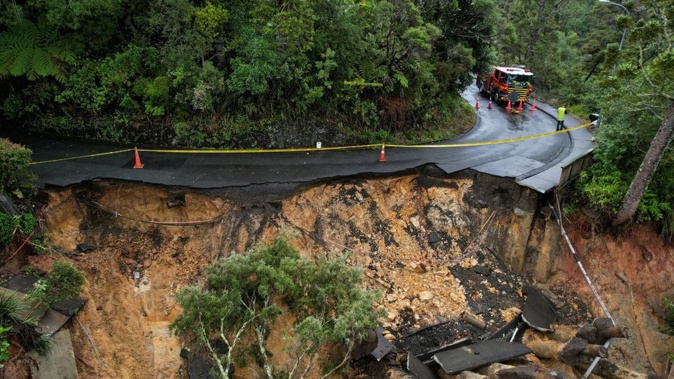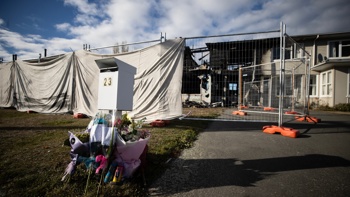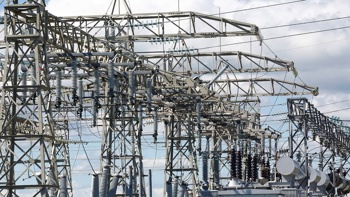
Thieves looted Amrita Aujla’s flood damaged West Auckland home for the fourth time recently.
That’s despite there’s being barely anything left in the Swanson house one year after it was made uninhabitable by the Auckland Anniversary weekend floods.
Now the thieves are trying to strip copper wiring out from the property.
“It’s just outrageous that people are looting, you can only imagine how much stress it adds,” she told the Herald.
Every time there’s a new theft, Aujla has to file more paperwork with her insurer, a company she is still locked in negotiations about the $380,000 settlement pay-out it offered her for her home’s repairs.
She is holding out because she believes the sum is $100,000 too low.
She also has not heard from Auckland Council about her application to be part of council and central Government’s up to $800 million promise to get the most at-risk families out of harm’s way by buying their properties.
Aujla said the floodwaters ran 1.5m high in her home on January 27, 2023 and that her property has flooded as many as eight times in recent years.
She was two weeks away from giving birth in August 2021 during a Covid lockdown, when the previous flood before January 27 filled her garage and wrote off the family’s cars.
Yet council recently requested more information about her property from her.
She feels like she is just “waiting, waiting”, all while struggling fulltime as a new mum, paying rent and a mortgage, and doing it in a country away from her family support.
In the meantime, looters keep returning to her home, with the fourth incident having happened recently.
“Every time we get looted they take something from our house, even if there’s nothing,” she told RNZ.
“Every time we call insurance for another claim, they ask us to do another excess because our insurance hasn’t been settled either.”
Aujla also told RNZ each time her house was looted, she paid $1000 in excess.
“Maybe I should just leave the doors open and let them do whatever they want,” she said. “There’s nothing in there.”
/cloudfront-ap-southeast-2.images.arcpublishing.com/nzme/VGIFMJDJZZBFTCODXX4KVQJG2E.JPG)
On the same street as Aujla, there are other stories of despair.
Andrew Marshall’s property had also just been given a category three listing.
The looters had already been through his house when he came back after the floods, Marshall told RNZ. “Right from when we came back after that first night, there had been things taken,” he said.
“That was probably what took me right to the limit of my mental health ... I’d have a time window through the day, knowing that whatever family heirlooms or any items of material value I didn’t take, there was a very good chance they wouldn’t be there the following morning.”
Marshall also told RNZ the looters who struck his home were quite sophisticated.
“Anything that wasn’t taken by the flood was taken by the looters, tools, my little dinghy out the back ... concrete mixer,” he said.
“Through the house as well, they’ve got no respect for a red sticker, so they can go in there quite happily but you’re not allowed to.”
“The police said they’re like rats, eventually they’ll start taking windows, doors, and just strip the place.”
Nick Vigar, head of planning for Auckland Council’s Healthy Waters department, said he knows “it is absolutely dreadful” for families to have to sit and wait for council to make these decisions.
But he said the wheels are moving faster now.
It took until about July last year for central Government and council to agree upon a $2 billion Anniversary weekend flood recovery programme.
After that his team was given the go-ahead to create modelling that would help decide which homes posed a “risk to life”, Vigar said.
The team decided that when flood waters are estimated to flow through a property above a certain depth and faster than a certain velocity, it is considered unsafe and eligible for a buy-out.
Affected homes include clusters in the West Auckland suburbs of Ranui, Swanson and Henderson and coastal communities of Piha, Karekare and Muriwai. Other clusters are in Milford and Māngere.
The first 100 such homes were identified late last year.
Nearly all have so far been “Category 3″ in which it is considered nothing can be done to make them safe.
But other homes will be categorised as “2p”. That means they are currently a risk to life unless “property-level” interventions are made within two years and below a certain maximum price, such as by raising the home on piles above flood waters and creating a raised access for safe entry and exit.
A third “2c” category is for homes where there is a risk to life that can only be mitigated if council completes large infrastructure projects nearby, such as by building culverts or clearing streams for better stormwater run-off.
Council hopes to identify most of the 2c homes by March. Yet building the new community infrastructure needed to make them safe could take between five and 10 years.
One year on, many families still left in limbo
Council expects about 600 category 3 homes, 100 category 2p homes and 400 category 2c homes are expected to be offered financial packages. This means the buy-out process could range from months to years, or even a decade, depending on each individual home.
Yet all these homes remain at a high risk from flooding or landslips should another big storm hit in the meantime.
And many families continue to be left in limbo.
The Insurance Council of NZ, meanwhile said it’s settled 50,119 of the almost 60,000 claims it received from the Auckland Anniversary floods, resulting in $1.5 billion in payouts so far.
Ranui resident Tracey Pilgrim was not able to secure insurance before the January storms and so applied for a Government buy-out.
/cloudfront-ap-southeast-2.images.arcpublishing.com/nzme/ATMJM2RYRFAYBJM4GR3V4G2M64.jpg) Tracey Pilgrim sits in her tiny home that she shares with her husband and their dogs located at her husband’s work in Henderson. Photo / Dean Purcell
Tracey Pilgrim sits in her tiny home that she shares with her husband and their dogs located at her husband’s work in Henderson. Photo / Dean Purcell
She was told just before Christmas her home qualifies as Category 3.
Yet the news is not completely welcome.
Her Ulrich Dr property in Ranui in 2019, has flooded five times in four years, with last January’s being the most devastating.
During the previous August 2021 floods, her family had to rescue her 91-year-old mum by carrying her in her wheelchair above the flood waters.
That flood completely damaged her home, leading the family’s insurer to make a settlement payout which the bank seized to pay down the property’s mortgage.
Heartbroken residents take matters into their own hands
Working hard at night and on weekends, the family renovated their home themselves and were almost close to finishing it and being eligible for new insurance when the anniversary weekend floods hit, causing them to lose everything again.
Despite being heartbroken, the family found the pace of Government relief achingly slow. So they began last July to make plans to pay to have their home raised up to avoid future flood waters.
Yet when they were told before Christmas they would qualify as a Category 3 buy-out they had to cancel their building plans and face the reality of life away from their home.
Pilgrim was devastated and said the “voluntary buy-out” didn’t feel so voluntary, given she would likely find her property uninsurable if she didn’t accept the council’s buy-out offer.
“It’s like a rollercoaster,” she said.
“You’re doing a complete 180 every time … in your life path, and it’s really challenging.”
- Additional reporting by RNZ
Take your Radio, Podcasts and Music with you









